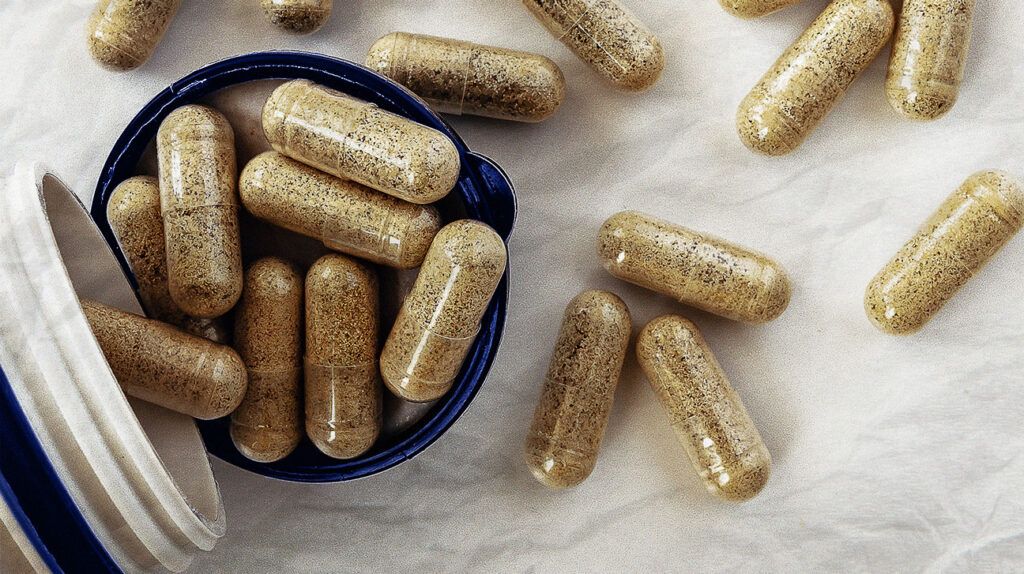Although some small studies suggest that digestive enzymes may help reduce bloating and other gastrointestinal (GI) symptoms, there is not enough clinical evidence to support this.
Digestive enzymes are complex proteins the body naturally produces in the GI system to help break down food for absorption. A person can also take digestive enzymes as supplements in tablet or pill form.
More research is necessary to find out whether digestive enzyme supplements can help reduce bloating.
This article looks at what digestive enzymes are, what they do, whether they can help with bloating, and who might benefit from taking them.
It also examines where people can find digestive enzyme supplements, how to take them, and what side effects they may cause.

The body produces digestive enzymes to break down food into nutrient components that are small enough for the bloodstream to absorb. These components help the body perform necessary functions
The body produces enzymes in the saliva, stomach, pancreas, small intestine, and liver.
Types
The various digestive enzymes in the body have the following
- Lactase: breaks down lactose, a sugar in dairy products, in the small intestine
- Amylase: occurs in saliva and the pancreas and helps break down starches and complex carbohydrates
- Maltase: present in saliva and the pancreas and helps break down maltose, a type of sugar in grains
- Sucrase: breaks down sucrose, a type of sugar in fruit and vegetables, in the small intestine
- Peptidase: breaks down proteins in the pancreas, stomach, and small intestine
- Chymotrypsin: breaks down proteins in the pancreas
- Trypsin: breaks down proteins in the small intestine
- Pepsin: breaks down proteins in the stomach
- Lipase: breaks down fats in the pancreas
- Elastase: breaks down fats, proteins, and carbohydrates in the pancreas
Although anecdotal evidence and some small studies, outlined below, suggest that digestive enzyme supplements can help reduce bloating and other GI symptoms, more research is necessary.
The authors of a
A small 2017 study found that digestive enzymes and other supplements may reduce bloating and other symptoms in people with irritable bowel syndrome and inflammatory bowel disease (IBD).
The authors of a
The authors mention that promising research is ongoing into the treatment of diseases unrelated to enzyme deficiency.
Digestive enzymes that help replace deficient pancreatic enzymes may be the most effective at improving digestion, which could help reduce bloating and other symptoms.
These
- amylase
- lactase
- protease
- lipase
Someone
Various other conditions can also prevent the pancreas from functioning effectively,
- cystic fibrosis
- acute or chronic pancreatitis
- surgery to the upper GI tract or pancreas
- pancreatic cancer
- celiac disease
- inflammatory bowel disease
- diabetes
Who should not take digestive enzyme supplements?
Some digestive enzyme supplements may not be suitable for everyone.
People who are pregnant or nursing should consult a healthcare professional before taking any supplements.
Certain digestive enzyme supplements
Other digestive enzyme products may contain potential allergens, such as bromelain, which is derived from pineapple. People with a pineapple allergy should avoid taking any supplements that contain bromelain, as it could cause a severe reaction such as anaphylaxis.
Some digestive enzyme supplements may interact with medications. For example, bromelain may affect the body’s absorption of certain chemotherapy drugs. A person should discuss taking digestive enzymes or any other supplements with their doctor to avoid drug interactions.
Digestive enzyme supplements are available over the counter (OTC) or, in some cases, by prescription. A doctor may prescribe them if a person’s pancreas does not produce enough enzymes. Certain foods also contain digestive enzymes.
OTC
A person can find OTC digestive enzyme supplements in pharmacies or online.
The price and quality of OTC supplements can vary widely, and products may contain allergens such as dairy or gluten.
A person may want to talk with a doctor about which brand and type of digestive enzyme supplement might be most beneficial.
Prescription
Doctors may prescribe digestive enzyme supplements for people with EPI.
Pancreatic enzyme replacement therapy is the
Food sources
Foods that contain digestive enzymes include:
A person should take digestive enzyme supplements with meals and make sure to follow the instructions on the packaging or their doctor’s recommendation for dosage.
Different dosages may be appropriate for different types of digestive enzymes.
Possible side effects of digestive enzyme supplements
- abdominal pain
- nausea
- vomiting
- head and neck pain
- oral irritation
- nasal congestion
- lymphadenopathy
Below are the answers to some frequently asked questions about digestive enzymes.
What is the difference between digestive enzymes and probiotics?
Digestive enzymes and probiotics work in different ways and may be beneficial
Probiotics are live organisms that
Do digestive enzymes help with weight loss?
Digestive enzymes may not directly affect weight loss. However, they may help improve gut health, which
What conditions can cause digestive enzyme deficiency?
Conditions that affect the functioning of the pancreas,
Will digestive enzymes cause a person to poop more?
Diarrhea and frequent pooping are
Do digestive enzymes help with constipation?
More research is necessary to determine whether digestive enzymes can help treat constipation and other digestive concerns.
Some small studies support the use of digestive enzymes to treat bloating and other GI issues. However, more research is necessary to find out whether digestive enzyme supplements are beneficial.
A person should discuss taking digestive enzymes with a healthcare professional, as these products may cause side effects and interact with medications. They may also contain animal products and allergens.
